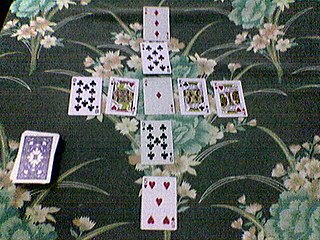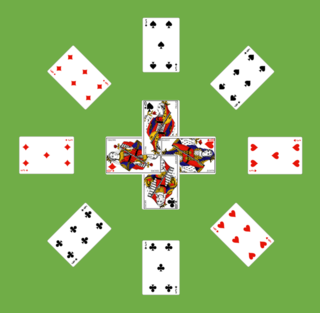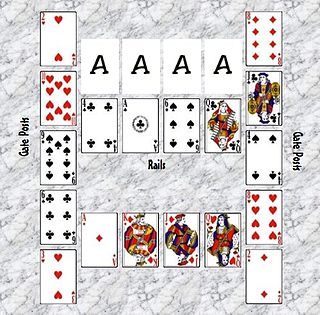Related Research Articles
Musical is a patience or card solitaire using a single deck of 52 playing cards. It is similar to another old game called Calculation except there is no tableau to play in and there is only one wastepile rather than four.

Windmill is a solitaire card game played with two decks of playing cards; it is a relatively mechanical game that isn't won that frequently. It is so called because of its distinctive initial layout, which resembles a windmill's sails. It is also known under the name Propeller.

Quadrille is the name of two loosely related card games of the Patience or solitaire type which are often confused. Both use a pack of 52 playing cards. The earlier one was also known as La Française or Royal Quadrille, the slightly later one as Captive Queens. The name is derived from the desired end result of the earlier game in which the four Kings and Queens are arranged in a square formation as in the European dance of quadrille that was fashionable in the 18th and 19th centuries.
Royal Cotillion is a solitaire card game which uses two decks of 52 playing cards each. The name probably derives from the fact that since the two kings and two queens of the same suit, the king and queen of each suit dance the cotillion. It has been given the alternate name of Lords and Ladies because if the game is won, the final layout will show the king and queen of each suit together.

Crazy Quilt is a solitaire card game using two decks of 52 playing cards each. The game is so-called because the reserve resembles the weaves of a carpet or an arrangement of a quilt, with cards alternating vertical and horizontal rotations. The arrangement of the cards on the reserve is also the reason it is rarely seen on computer solitaire packages, most of which have their cards placed vertically.
Eagle Wing is a Patience game which is played with a deck of 52 playing cards. The game takes its name from the tableau which depicts an eagle-like bird spreading its wings in flight. It is somewhat related to the Canfield variant Storehouse.
Royal Rendezvous is a solitaire card game which uses two decks of playing cards shuffled together. It is also known as Royal Appointment.
Duchess or Glenwood is a patience or solitaire card game which uses a deck of 52 playing cards. It has all four typical features of a traditional patience or solitaire game: a tableau, a reserve, a stock or talon and a wastepile. It is relatively easy to get out. It is a reserved packer, the same type of game as Canfield or Demon. Arnold describes it as "an interesting game with a fair chance of a favourable outcome."

Colorado is a solitaire card game which is played using two decks of playing cards. It is a game of card building which belongs to the same family as games like Sir Tommy, Strategy, and Calculation. It is considered an easy game with 80% odds of being completed successfully.
Odd and Even is a solitaire card game which is played with two decks of playing cards. It is so called because the building is done in twos, resulting in odd and even numbers.
Intrigue is a solitaire card game which is played using two decks of playing cards. It is similar to another solitaire game called Salic Law, but it also involves the queens and building in the foundations goes both ways.
The Plot is a Patience game which is played with two decks of playing cards.

Four Seasons is a patience or card solitaire which is played with a single deck of playing cards. It is also known as Corner Card and Vanishing Cross, due to the arrangement of the foundations and the tableau respectively. Another alternate name is Cross Currents.
British Constitution is an English patience or card solitaire played with two packs of playing cards. It is a card game with a high chance in winning.

Fortune's Favor or Fortune's Favour is a patience or card solitaire which is played with a deck of 52 playing cards. It is so-called probably because the chances of winning are completely on the player's side. It is a significantly simplified version of the game Busy Aces, a member of the Forty Thieves family of solitaire games.
Patriarchs is a patience or card solitaire which is played with two packs of playing cards. It is similar in reserve layout to Odd and Even but with different rules of play.
Frog is an old French patience or solitaire card game which is played with two decks of playing cards. It belongs to the same family of solitaire games as Strategy, Sir Tommy, Calculation, and Puss in the Corner. Game-play is like Sir Tommy, but with two decks, a fifth waste pile, and a Canfield-like reserve. In its native France it is known as Le Crapaud.
Zodiac is a solitaire card game which is played with two decks of playing cards shuffled together. An old game, it first appeared in Lady Adelaide Cadogan's book Illustrated Games of Patience. It is so-named probably because of its "globe"-shaped layout. It had many variations until its rules were standardized in 1914.

Gate is a solitaire card game played using a deck of 52 playing cards, and is a member of the Canfield family. It gets its name because the cards are laid out in such a way that they form a gate. Average players can expect to win 99% of their games.
Following is a patience or card solitaire that uses a single pack of playing cards. It is so called because a player has to follow a rotation of suits. It was first described in 1892 in Games of Patience by Mary Whitmore Jones and has since appeared in other books and software.
References
- ↑ "Cotillion" (p.89) in The Little Book of Solitaire, Running Press, 2002. ISBN 0-7624-1381-6
